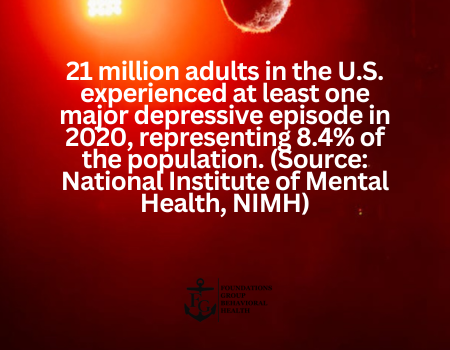Depression is a common and debilitating mental health condition that affects millions of people worldwide. Characterized by persistent feelings of sadness, hopelessness, and a lack of interest in daily activities, depression can take a significant toll on an individual’s emotional, physical, and social well-being. However, it’s important to remember that depression is treatable, and with the right strategies, professional care, and support, recovery is possible.
At Foundations Group Behavioral Health, we provide personalized care through programs such as Psychiatric Day Treatment, Half-Day Treatment Programs, and Outpatient Mental Health Programs, all designed to help individuals overcome depression and reclaim their lives.
What Is Depression?
Depression is more than just feeling sad or experiencing a rough patch. It is a serious mental health condition that affects how a person thinks, feels, and functions. It can interfere with work, relationships, and daily activities, making even simple tasks feel overwhelming.
Types of Depression
- Major Depressive Disorder (MDD): Characterized by severe symptoms that last for at least two weeks.
- Persistent Depressive Disorder (PDD): A milder form of depression that lasts for two years or more.
- Seasonal Affective Disorder (SAD): Depression that occurs during specific seasons, often in winter when sunlight is limited.
- Postpartum Depression: A type of depression that occurs after childbirth.
Signs and Symptoms of Depression
Depression affects each individual differently, but common symptoms include:
- Persistent sadness, hopelessness, or emptiness.
- Loss of interest in activities once enjoyed.
- Fatigue or lack of energy.
- Difficulty concentrating or making decisions.
- Changes in appetite and weight.
- Sleep disturbances (insomnia or oversleeping).
- Feelings of worthlessness or excessive guilt.
- Thoughts of self-harm or suicide.
If you or someone you know is experiencing these symptoms, seeking help from a mental health professional is crucial.
The Importance of Addressing Depression
Depression can impact every aspect of life, including physical health, relationships, and work productivity. Left untreated, it can lead to:
- Increased risk of substance use disorders.
- Chronic physical health conditions such as heart disease or diabetes.
- Strained relationships with family and friends.
- Thoughts of suicide or self-harm.
Early intervention and a comprehensive treatment plan can prevent these outcomes and lead to significant improvements in quality of life.
Effective Strategies for Fighting Depression
Recovering from depression often requires a multi-faceted approach that combines professional treatment, lifestyle changes, and self-care.
1. Seek Professional Help
Professional treatment is the cornerstone of recovery from depression. At Foundations Group Behavioral Health, we offer a variety of evidence-based programs to address depression.
- Psychiatric Day Treatment:
- Provides intensive support for individuals with severe symptoms.
- Includes therapy, medication management, and skill-building.
- Half-Day Treatment Programs:
- Offers flexibility for individuals balancing treatment with other responsibilities.
- Combines individual and group therapy with psychoeducation.
- Outpatient Mental Health Programs:
- Designed for individuals with mild to moderate symptoms.
- Focuses on maintaining progress and preventing relapse.
2. Therapy for Depression
Therapy is one of the most effective tools for addressing depression. Various therapeutic approaches can help individuals understand and manage their condition.
- Cognitive Behavioral Therapy (CBT):
- Helps individuals identify and change negative thought patterns.
- Focuses on developing healthier ways to cope with challenges.
- Dialectical Behavior Therapy (DBT):
- Combines mindfulness with emotional regulation techniques.
- Effective for individuals with co-occurring conditions or intense emotions.
- Interpersonal Therapy (IPT):
- Focuses on improving relationships and resolving social conflicts.
- Group Therapy:
- Provides a supportive environment to share experiences and learn from others.
3. Consider Medication
Antidepressants can be an important part of treatment for some individuals. These medications work by balancing brain chemicals that affect mood.
- Common Types of Antidepressants:
- SSRIs (Selective Serotonin Reuptake Inhibitors), such as fluoxetine or sertraline.
- SNRIs (Serotonin-Norepinephrine Reuptake Inhibitors), such as venlafaxine or duloxetine.
- How to Use Medication Effectively:
- Work closely with a psychiatrist to find the right medication and dosage.
- Be patient, as it may take several weeks to see improvements.
- Use medication in conjunction with therapy for the best outcomes.
4. Build Healthy Lifestyle Habits
Lifestyle changes can have a significant impact on managing depression.
- Exercise Regularly:
- Physical activity releases endorphins, which improve mood and reduce stress.
- Aim for 30 minutes of exercise, such as walking, jogging, or yoga, most days of the week.
- Eat a Balanced Diet:
- Include nutrient-dense foods like fruits, vegetables, whole grains, and lean proteins.
- Avoid excessive sugar and processed foods, which can contribute to mood swings.
- Prioritize Sleep:
- Establish a consistent sleep schedule.
- Create a calming bedtime routine to promote restful sleep.
5. Practice Mindfulness and Relaxation
Mindfulness and relaxation techniques can help individuals manage stress and reduce symptoms of depression.
- Mindfulness Meditation: Focus on the present moment to reduce rumination and improve mental clarity.
- Deep Breathing Exercises: Slow, intentional breathing calms the nervous system and lowers stress levels.
- Yoga or Tai Chi: Combines physical movement with mindfulness, promoting relaxation and balance.
6. Foster Social Connections
Depression often leads to isolation, but maintaining social connections is vital for emotional well-being.
- Stay Connected: Reach out to trusted friends or family members for support.
- Join a Support Group: Share experiences and learn from others facing similar challenges.
- Participate in Group Activities: Engaging in hobbies or community events fosters a sense of belonging.
7. Engage in Meaningful Activities
Finding purpose and joy can significantly improve mood and motivation.
- Pursue Hobbies: Revisit old interests or explore new ones to bring fulfillment.
- Volunteer: Helping others can provide a sense of purpose and combat feelings of hopelessness.
- Set Achievable Goals: Break tasks into small, manageable steps to build confidence and a sense of accomplishment.
8. Address Co-Occurring Disorders
Depression often coexists with other mental health conditions, such as anxiety or substance use disorders. Treating these conditions together is crucial for long-term recovery.
- Co-Occurring Disorder Treatment Programs:
- Integrates care for depression and other conditions.
- Provides a holistic approach to address interconnected challenges.

The Role of Foundations Group Behavioral Health in Fighting Depression
At Foundations Group Behavioral Health, we provide comprehensive, personalized care to support individuals on their journey to recovery.
Why Choose Us?
- Evidence-Based Programs: We offer proven treatments such as CBT, DBT, and medication management.
- Tailored Care: Each treatment plan is customized to meet individual needs.
- Holistic Approach: Our programs address the mind, body, and spirit for lasting recovery.
- Compassionate Team: Our experienced clinicians are dedicated to providing empathetic, high-quality care.
Tips for Caregivers Supporting Someone with Depression
Caregivers play a vital role in helping loved ones manage depression.
- Educate Yourself: Learn about depression to better understand its impact.
- Be Patient: Recovery takes time, and setbacks are part of the process.
- Encourage Professional Help: Support your loved one in seeking therapy or joining a treatment program.
- Practice Self-Care: Prioritize your own mental health to avoid burnout.
Take the First Step Toward Recovery
Fighting depression is a challenging journey, but with the right tools, support, and determination, recovery is achievable. Whether you’re seeking help for yourself or a loved one, Foundations Group Behavioral Health is here to provide guidance and hope.
Contact us today at 888.685.9730 to learn more about our programs, including Psychiatric Day Treatment, Half-Day Treatment Programs, and Outpatient Mental Health Programs. Let us help you take the first step toward healing and a brighter future.
FAQ on Fighting Depression
How is depression treated?
Depression is treated with a combination of therapy, medication, and lifestyle changes. Programs like Psychiatric Day Treatment and Outpatient Mental Health Programs provide structured support for recovery.
What types of therapy are effective for depression?
Effective therapies include Cognitive Behavioral Therapy (CBT), Dialectical Behavior Therapy (DBT), Interpersonal Therapy (IPT), and group therapy. These approaches help individuals manage symptoms and develop healthier coping mechanisms.
Can lifestyle changes help with depression?
Yes, lifestyle changes like regular exercise, a balanced diet, quality sleep, and stress management can significantly reduce depression symptoms and improve overall well-being.
When is medication necessary for depression?
Medication may be necessary for individuals with moderate to severe depression or those who do not respond fully to therapy. Antidepressants can help balance brain chemicals that affect mood.
How does Foundations Group Behavioral Health support individuals with depression?
We offer programs like Half-Day Treatment Programs, Anxiety Treatment Programs, and Depressive Disorder Treatment Programs that include therapy, medication management, and holistic care tailored to individual needs.








